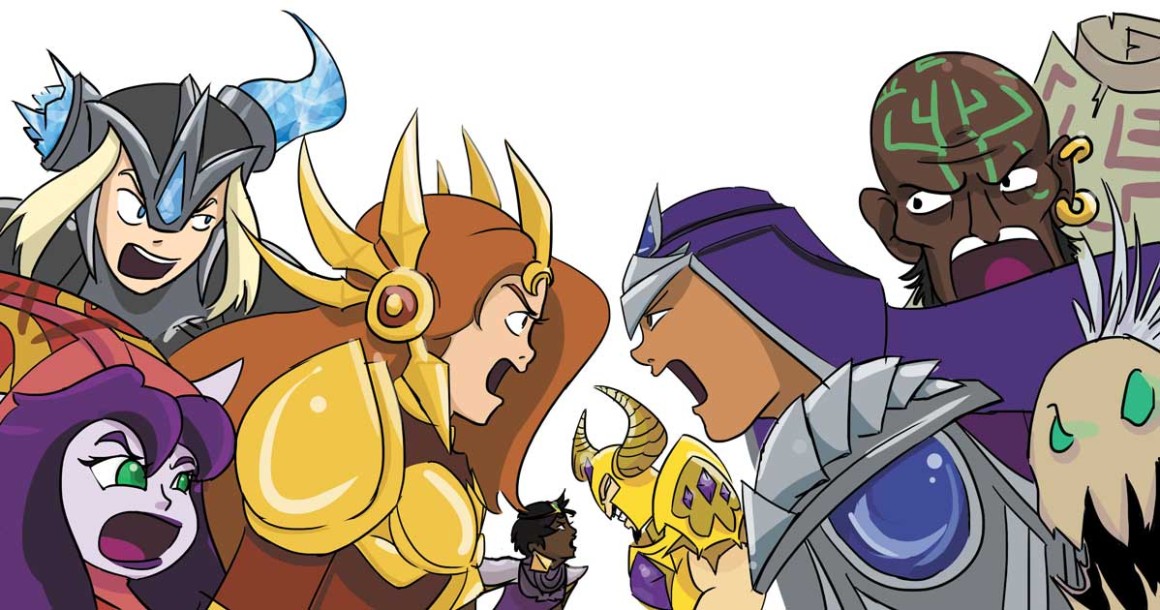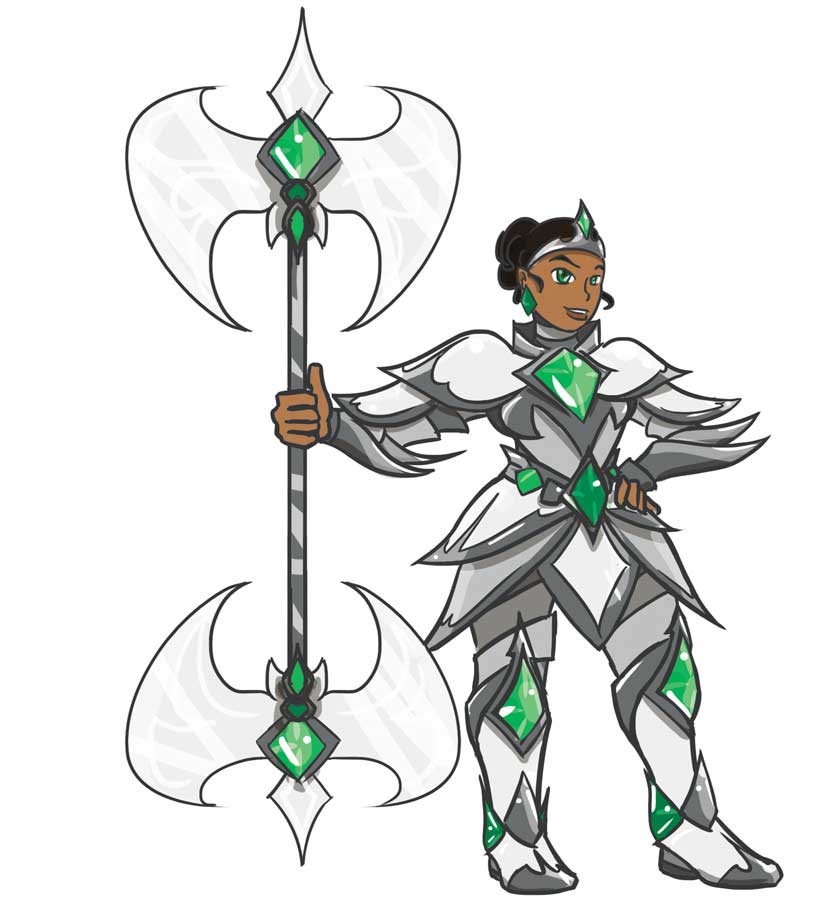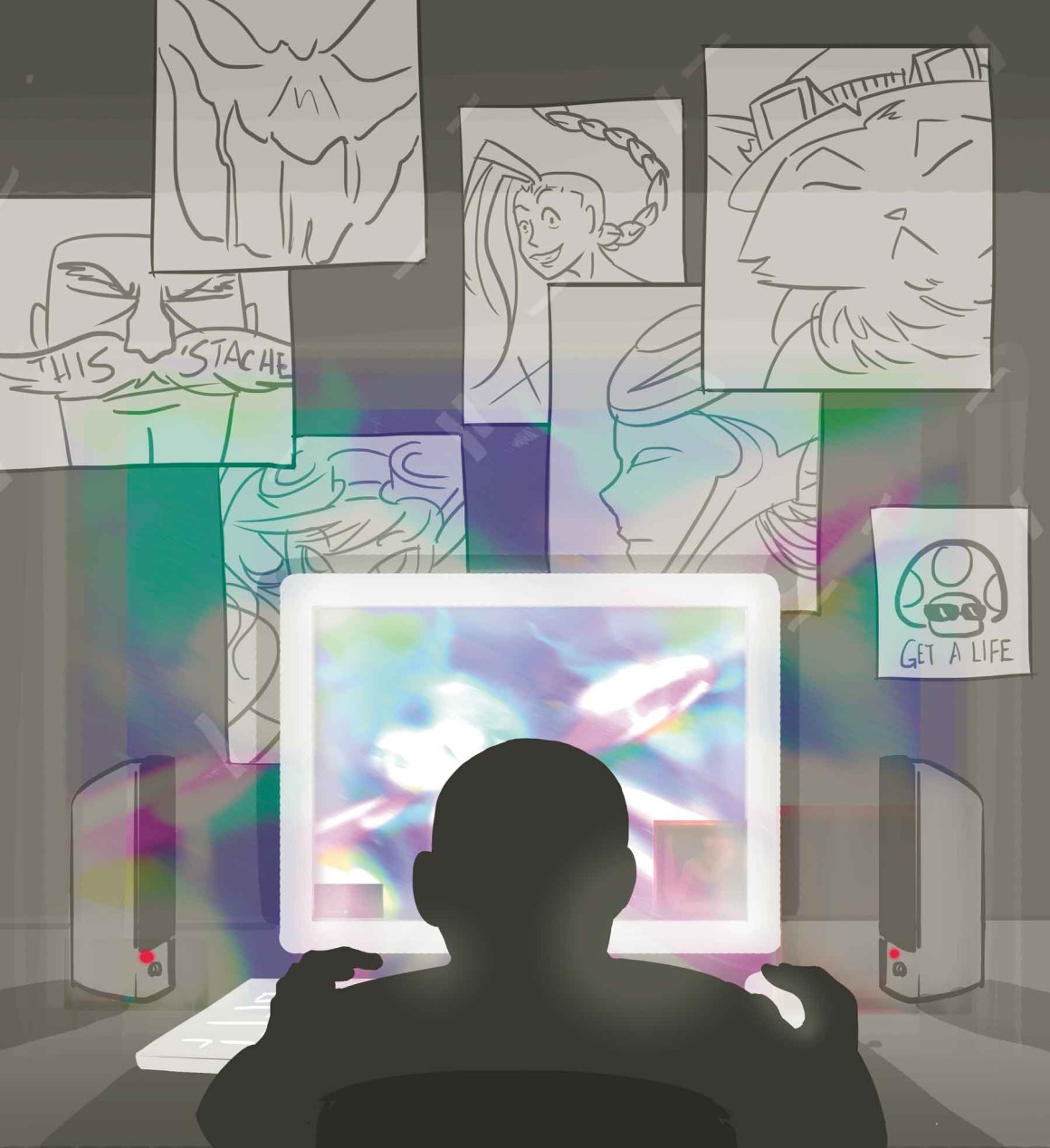
Not Just a Boy’s Club Anymore
By Emilie Medland-Märchen, November 13 2014 —
Enter the online arena of a video game and the outside world loses meaning. The player leaves everything behind the screen, their flickering fingers projecting body and mind into a new character. For hours, gamers can abandon their identity and mould a new one — a mythologized, enhanced representation of themselves.
But the player’s skill still dictates the success of the character. At least, it should. Racial or gender politics can trap players with constrictions they might have hoped to escape. When the virtual world clashes with the physical, the results can be explosive.
Gender politics has put gaming in the headlines. Women involved in the gaming community, like YouTuber Anita Sarkeesian and game developer Zoe Quinn, have experienced backlash from gamers online, including death threats which have resulted in Sarkeesian abandoning her home. Both Quinn and Sarkeesian have been outspoken about the issue of sexism in the video games industry, both in its portrayal of women’s bodies and the treatment of female developers within the industry.
A cultural movement called GamerGate has appeared in response, largely taking place over Twitter. GamerGate has accused Sarkeesian and Quinn of hypocrisy and lying to manipulate public sympathy for self-promoting purposes. Two polarized sides of the issue have sprung up: one under the banner of the GamerGate hashtag, and another in support of Sarkeesian and Quinn. The issue has developed a gendered tone, as those in support of GamerGate are seen as stereotypically male and those against it female.
The GamerGate fiasco does not fall into a moral black and white. Video game culture in general does contain sexist imagery and stereotyping. Treatment differs significantly between the two genders. Women receive a lot of attention if they reveal their gender online, but for all the wrong reasons. Girls are invited to join guilds and parties — temporary groups of players banding together to accomplish a specific mission — not because of their skill, but because they are women.
On the other hand, guys are given opportunities in gaming worlds based on how good they are. Nobody cares if you’re a 40-year-old guy still living with mom, or if you believe Obama is the antichrist and Ebola the first act of his vengeance on the world. If you’re skilled enough to survive a beating from the boss or dominate the competition, someone, somewhere will accommodate you. This makes distinguishing oneself in the gaming scene more challenging for men, but they won’t be plagued by doubt that they got there through favouritism.
Female gamers are dogged by a stereotype from real life. They are automatically designated to roles as healers and support classes. My experience has been that if a woman is playing a more aggressive role, she is subject to greater criticism of her skill than her male counterpart. Gaming culture doesn’t encourage women to move beyond support roles. It’s considered rare for women to play more aggressive roles and be highly skilled at them.
Zach High-Leggett, a women’s studies major who holds a degree in computer science, agrees that women are often talked down to.
“I haven’t experienced harassment personally, but I think that’s because of my gender honestly. I am a guy, I don’t see this treatment towards myself. But I’ve seen a lot of the treatment that women receive. There’s a lot of homophobia and racism online.”
But while women are treated terribly in video games, so is everyone else.
The toxicity is astounding. In many online games, the only behavior players are usually punished for is leaving early. Players who perform poorly are targets for unsolicited criticism and vulgarity, usually from players perceived as more skilled.
Racial slurs, religious intolerance, homophobia, sexism and hyperbolic threats all thrive online.
The cynicism and prejudice of the video gaming community in general is a problem that game developers and players must recognize. While there are some friendly players, chat often degenerates into cursing and vile insults over trivial disagreements. Unsavory behaviour affects everyone, although it’s true the groups most at risk to bigoted treatment are people that the gaming community considers outsiders, such as women.
Without confronting the community’s attitude, gaming will deteriorate in a stasis field of negativity. Without a positive environment to develop skills in, or the opportunity to break tropes and tell diverse and meaningful stories, the quality of the games will degenerate.
I play League of Legends, a game in which each player controls a character as a part of a five-person team. Up against another team of five players, the objective is to destroy that team’s Nexus, winning the game. The game
enjoys popularity because success favours a team of five, averagely-skilled players over one ringer. Teams fail when they refuse to synergize and cooperate. This is ironic considering the temperament of the typical player.
Every League of Legends match features five roles which require a different skillset. The three aggressive roles are the tank, jungler and assassin. Two more defensive roles, the support and the attack-damage carry, or ADC attack from afar. In the case of the ADC, the player must deal ranged damage. The support heals, extends the team’s line of vision and casts shields.
Victory is achieved through focused, coordinated effort. There are no superstars, no game-breaking Hail Mary plays. Like a game of sports, a team that stands the best possible odds communicates with each other and executes tasks smoothly and consistently.
League suffers from a damaged community which makes this level of teamwork difficult. Unless playing with a team of friends, players are matched with other randoms playing from within their continent. The lack of moderation over behaviour and a playerbase full of diverse backgrounds has created a hostile social climate.
Devin MacInnis, a Natural Sciences major and a member of the League of Legends club, suggests that all players are subject to some form of harassment.
“I’ve experienced a lot of toxicity,” MacInnis said. “Just people telling you to kill yourself, people mistaking you for an American, even though I’m Canadian. Like, ‘Oh, stupid American,’ okay I’m Canadian, but whatever. Any kind of forms like,
‘Uninstall the game.’ If you’re playing bad, ‘Oh uninstall, never play ADC again.’ If you poorly perform people always harass you. There’s definitely racist toxicity too. Obviously people will drop the N-word, three times, they don’t care, they’ll discriminate.”
Thanks to an ineffective tribunal system that punishes players for leaving games, not for harassment or vulgarity, League demonstrates what happens when a community of gamers do not have to to display sportsmanship. The justice system of League, or the Tribunal, lets high-ranking players cast judgment on whether others should be banned or not based on their chat history. While this casts some responsibility of community-building back to the players, it is also laziness on the part of the developers.
The problems facing games like League don’t start or end with women. The treatment of minority groups only reflects the problem with communities that have no behavioural standards. When developers and moderators make an effort to set the bar higher and create a more inclusive and friendly environment, gamers will hopefully treat one another with respect.
“There have been times where I have uninstalled the game and said that I need to take a break from this community. I would go and escape with a different game. And then when I felt reenergized I would go back in and hopefully have a better experience,” MacInnis says.
“Video games serve as a way to escape from the troubles of University or, they provide you with a good way to shift your attentions, and your stress, which is probably a lot of the reason why we see toxicity, like people being passive aggressive in their daily lives and expressing it to random people on the internet,”
Foul play and harassment have long plagued the world of professional sports. Regulatory bodies expect athletes to demonstrate sportsmanship on and off the court. At the Olympic Games athletes must swear an oath to compete in a fair, respectful and sportsmanlike way. Heckling and abuse is often punished with suspension. As the condemnation of NFL player Ray Rice’s assault on his fiance demonstrates, the actions of athletes outside their arenas must also represent those of lawful citizens.
The gaming community is not held to the same standard. At one point this might have been due to the underground nature of gaming, the last several years have seen the rise of E-Sports, in which teams from across the world play games such as League in highly competitive tournaments.
In last year’s World Championships, the winning Korean team, SK Telecom T1, took home $1,000,000 for first place. The second- and third-place teams each won $250,000 and $150,000. Video games aren’t just for basement-dwelling nerds anymore. Pro gamers are bonafide celebrities at home. People take this shit seriously.
According to the Entertainment Software Association ratio of male-female gamers nears fifty-fifty. However, the community still reinforces the misconception that women don’t game. Although female gamers make up nearly half of the gaming population, the types of games they tend towards are different than those played by men. Women have a tendency to play less time-intensive games like Candy Crush. Their presence is minimal in competitive games like League of Legends or its counterpart, Defence of the Ancients.
Women do exist in these environments, but they face under-representation and prejudice in competitive gaming. The extent of these obstacles varies between different online games. Games like World of Warcraft have a fairly balanced playerbase of men and women, while obscure games, especially independently developed ones, are dominated by male gamers.
A survivalist indie game I played over the summer, Rust, largely fit this mould. During my adventures watching naked men kill each other with rocks and machine guns, I recall a user in chat saying that, “No girls play Rust.” Player names appeared male, like, “Slicktitties482.” Etc.
The easiest way to avoid harassment is to pretend that you’re a guy. The disguise starts with your username. There’s a code on the Internet for determining whether or not a user is a girl or guy based on their name. Any name that makes reference to some cute mammal or fluffy food product — BadCupcakes98, StrugglePanada, CandyCaneCounter, gets pounced on as feminine. Likewise, a name with a lot of numbers in it, or a sexual joke is probably a guy — TheBigKid42805, BallsDeep666, etc. From the moment you join a server, others’ perception of you will be coloured with gendered assumptions based on your name.
Pretending to be male is easy, but creates extra problems. Hiding one’s gender can only work for so long: a lot of gamers use Skype while they play, and the pitch of a woman’s voice can give her away. Closeted female gamers have a disadvantage if they don’t use voice communication: talking over Skype or Teamspeak benefits the team’s coordination much more than typing, which takes too much time.
Sarkeesian and Quinn are correct when they say that women are unwelcome in the gaming community. But the GamerGate controversy and observation of the community in general shows that the problem doesn’t exist as a black and white issue of men abusing women. Everyone online has a problem with everyone.
Male and female gamers need to make more of an effort to make the online gaming world less toxic for both genders. Female gamers interested in competitive gaming need to come out of the closet and strive to be their best. Gaming isn’t a boys-only club anymore.


